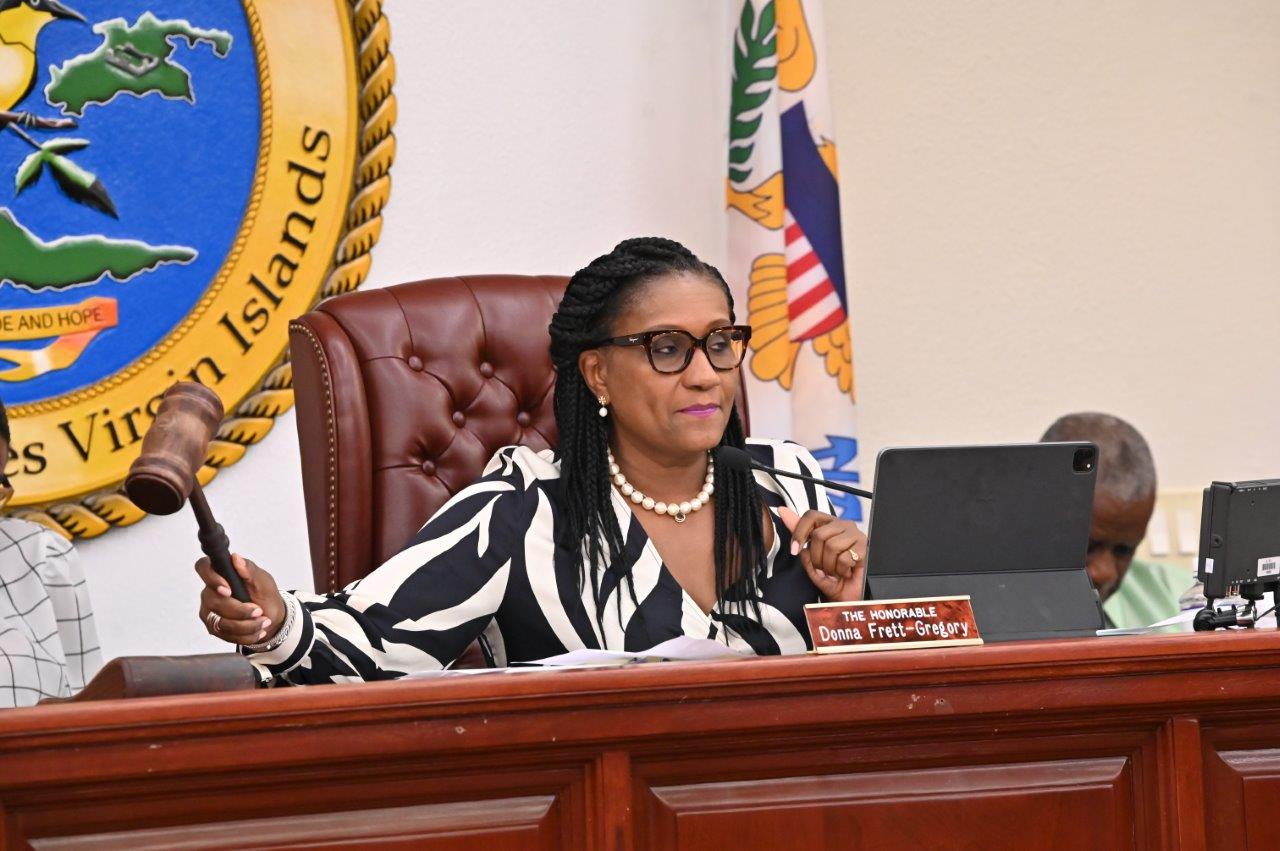
During Tuesday’s Committee on Budget, Appropriations, and Finance hearing, Office of Management and Budget Director Jenifer C. O’Neal testified that the $100 million line of credit requested by the governor’s financial team has not been closed, thus resulting in $45 million being taken from the legislative General Fund to help pay the V.I. Water and Power Authority’s debt to Vitol, its propane supplier.
The General Fund is used to finance the government’s daily and long-term operations and is managed by the Legislature. Gov. Albert Bryan Jr.’s financial team came to the Senate body to provide an overview of the budget for 2024 fiscal year. Lawmakers questioned O’Neal as to who gave the authorization to utilize the General Fund.
O’Neal stated that the line of credit approval gave them the right to do so, but senators said it does not: General Fund appropriations must be approved by the Senate body. The unauthorized use of funds now puts the budget at a potential $45 million deficit risk, they said.
“What local bank did we receive the line of credit from, what interest did we get, and do we have an estimated time frame of when the line of credit will be?” Sen. Dwayne DeGraff asked.
“We are working with First Bank, and the interest rate should be about 6 percent, with the pending approval of two weeks,” O’Neal said.
The terms of the legislation were that the reimbursement of the line of credit would come from tax incentives and revenue from the territory.
According to O’Neal’s testimony, the total operating revenue increased seven percent for fiscal 2021 and 2022, with an increase of six percent between FY 2022 and FY 2023. Increases of 15 percent are forecast for corporate income tax and Gross Receipt taxes, whereas real property taxes are expected to increase five percent. Excise tax collections are expected to increase by four percent; however, personal income tax revenue is expected to decrease by 2.7 percent. The General Fund revenue is projected to increase by 3.4 percent. The five-year outlook indicates that the General Fund will continue to grow, said O’Neal.
Sen. Angel Bolques noted that the USVI has been placed back on the European Union’s tax haven blacklist since February. The blacklist is a list of non-cooperative jurisdictions for tax purposes to fight tax evasion and avoidance. The USVI was first placed on the list of high-risk jurisdictions that “pose significant threats” to the EU financial system in March 2018. Although it was removed in 2019, it is now back on the list.
Bolques asked, “What does that mean and how that impacts economic opportunities and what is the administration strategy to have us removed?”
O’Neal said they “have been working with the delegate to have us removed. We are not an entity of ourselves and a part of the U.S. and should not be on the list, working with the federal government to get us removed. I don’t know what the impact is.”
Among the concerns of Sen. Donna A. Frett-Gregory was whether the governor’s financial team should be submitting a two-year budget, uncertain if the Legislature could consider it based on the interpretation of the Revised Organic Act.
Chief Legal Counsel Amos Carty Jr. said the Legislature could not consider a biennial budget unless the Executive Appropriations Act was amended to allow for such.
“The numbers presented in FY 2022 were significantly higher than what we see today,” Frett-Gregory stated. Sen. Alma Francis Heyliger asked if any measures could be taken regarding the difference.
The OMB director explained that the numbers were constantly being revised based on actual numbers and at times, the department reprograms things to see what would make sense.
O’Neal’s testimony revealed that challenges such as the lack of timely payments, funding to commence scoping and design on projects, and procurement of materials affect the pace of the recovery projects. The government continues to expend COVID-19 funding spanning both fiscal years. Expected expenditures for FY 2024 are $100 million and the funds will be fully obligated by December 2024 and will be fully expended by December 2026, she said.
The proposed executive budget totals $1.4 billion, with $969 million coming from the General Fund. This is an approximately $32 million increase from the FY 2023 executive budget.
“The budget overview is extremely important to determine if the revenue projections accurately reflect the collections over the previous fiscal years. The Legislature is mandated by law to adopt a balanced budget and the collections of revenues is an important component of the budget process,” said Frett-Gregory.
Budget hearings resume on Monday with the Office of Management and Budget, Education Department, Board of Education, and the Career and Technical Education Board.
Sens. Donna Frett-Gregory, Carla Joseph, Angel Bolques Jr, Ray Fonseca, Dwayne M. DeGraff, Kenneth Gittens, Alma Francis Heyliger, Javan James Sr, Milton Potter and Marvin Blyden attended Tuesday’s hearing.





